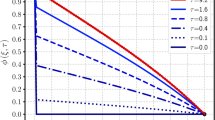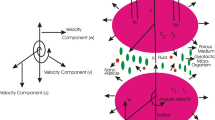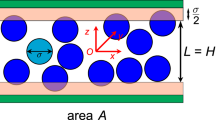Abstract
WHEN an incompressible fluid flows at a constant rate through a constant-volume system, the mean residence time of the fluid elements is equal to the ratio of the volume to the volumetric flow-rate and does not depend on the nature of the flow pattern. This possibly surprising result is of value in several branches of science and technology: it was brought to the attention of chemical engineers by Danckwerts, and is associated in the biological literature with Stewart and Hamilton2,3. Early proofs assume that the fluid, having entered the system, may leave only through the exit and, having left, cannot return. Such a system is said by chemical engineers to be closed. Gibilaro has recently found4,5 that the mean residence time in a region of a flow system is the ratio of the volume of that region to the volumetric flow-rate through the entire system. The new result differs from the previous one in that fluid may pass through the region several times, or not at all, before leaving the system, and in that the region may be connected to the system in any way. Residence time is counted as the total time a molecule spends in the region before ultimately leaving the system, and the average is taken over all molecules entering the system, including those which never enter the region. Gibilaro also emphasised the diversity of possible applications: the mean residence time is of interest in the study of continuous chemical reactors, respiratory systems, rivers and so on. Washout experiments are used in biological studies6 but rarely in engineering. In a washout test, tracer is added continuously to the feed stream until steady conditions prevail. Tracer flow is then stopped; the inventory of tracer in the system recorded as a function of time is the washout function. This is related to the residence-time density and distribution functions of closed systems7 and may also be used in studies of non-closed (open) systems8. Here we show how the washout-function idea may be used as the basis of a mean-residence-time theorem of the same type as Gibilaro's but of wider compass: it can apply to non-flow, as well as continuous-flow systems.
This is a preview of subscription content, access via your institution
Access options
Subscribe to this journal
Receive 51 print issues and online access
$199.00 per year
only $3.90 per issue
Buy this article
- Purchase on Springer Link
- Instant access to full article PDF
Prices may be subject to local taxes which are calculated during checkout
Similar content being viewed by others
References
Danckwerts, P. V. Chem. Engng Sci. 2, 1–13 (1953).
Grodins, F. S. Circulation Res. 10, 429–446 (1962).
Zierler, K. L. Circulation Res. 10, 393–407 (1962).
Gibilaro, L. G. Nature 270, 47–48 (1977).
Gibilaro, L. G. Chem. Engng Sci. 33, 487–492 (1978).
Hearon, J. Z. Math. Biosci. 3, 31–39 (1968).
Buffham, B. A. & Kropholler, H. W. Math. Biosci. 6, 179–184 (1970).
Buffham, B. A. & Kropholler, H. W. Chem. Engng Sci. 28, 1081–1089 (1973).
Author information
Authors and Affiliations
Rights and permissions
About this article
Cite this article
BUFFHAM, B. Mean residence times in steady-flow and some non-flow systems. Nature 274, 879–880 (1978). https://doi.org/10.1038/274879a0
Received:
Accepted:
Issue Date:
DOI: https://doi.org/10.1038/274879a0
This article is cited by
-
Residence-time distributions in regions of steady-flow systems
Nature (1985)
-
Dopamine metabolism increases in post-mortem schizophrenic basal ganglia
Journal of Neural Transmission (1982)
Comments
By submitting a comment you agree to abide by our Terms and Community Guidelines. If you find something abusive or that does not comply with our terms or guidelines please flag it as inappropriate.



